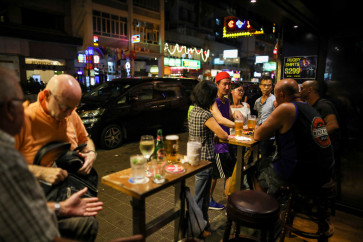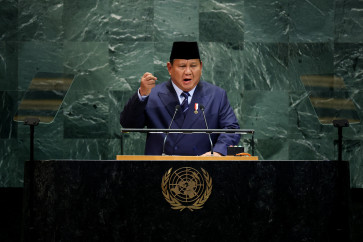Popular Reads
Top Results
Can't find what you're looking for?
View all search resultsPopular Reads
Top Results
Can't find what you're looking for?
View all search resultsSurvey finds rise in faith-based intolerance
Responding to a survey that shows an increasing trend of violence against minority groups, the government said that it faced difficulties in promoting religious tolerance
Change text size
Gift Premium Articles
to Anyone
Responding to a survey that shows an increasing trend of violence against minority groups, the government said that it faced difficulties in promoting religious tolerance.
A religious freedom watchdog, the Wahid Institute, published findings on Tuesday that saw an increase in cases of discrimination against minority groups.
The Wahid Institute recorded 190 violations against freedom of religion and faith in 2015, a 23 percent increase from 154 cases in 2014. The violations were mostly in the form of sealing places of worship and the prohibition of their construction, as well as obstructing celebrations or the performance of rituals of certain faiths.
West Java tops the list, with 46 violations, followed by Aceh with 36 cases and Jakarta with 23, making them the most intolerant provinces.
Confirming a recent finding from a survey by the Religious Affairs Ministry, the institute found a smaller number of violations in places where Muslims were the minority. East Nusa Tenggara and West Papua recorded the least number of violations, with only one case, each, during the year.
Institute director Yenny Wahid said that West Java was vulnerable to religious violations owing to the fast growth of conservative groups, including hard-line Islamic groups determined to expel minorities, which they considered deviant, in the name of public security.
The institute also found that the National Police were responsible for the most violations with 28 cases, followed by local administrations with 22 cases. As for non-state actors, unaffiliated citizens topped the list, with 29 cases. The Indonesian Ulema Council (MUI) and the Islamic Defenders Front (FPI) followed, with 21 and 13 cases, respectively.
Findings from the institute were also consistent with those from the National Commission of Human Rights (Komnas HAM), which also revealed an increase in the number of religious freedom violations: Around 87 cases in 2015, from 74 in the previous year.
West Java was again the region with the most violations, according to Komnas HAM data, followed by Jakarta and East Java. The local administrations were the top violators.
Both the institute and Komnas HAM data showed that the victims of the violations were mostly the Ahmadis, Christians, Shiite and Gafatar followers.
Religious Affairs Minister Lukman Hakim Saifuddin acknowledged that it was now more difficult to promote tolerance among people of different faiths on account of the growing influence of radical ideas.
Lukman also said that people held different perspectives in interpreting their faiths.
'The laws concerning religion in our country remain unclear. We don't have a precise benchmark to determine whether a faith is deviant,' Lukman said.
Komnas HAM commissioner Imdadun Rahmat said that officials at local administrations usually had political agendas.
'The way things work, many hard-line groups can press local authorities to relent to their demands, and this usually ends with the issuance of bylaws discriminating against minority groups,' Imdadun said.
Home Minister Tjahjo Kumolo said that the central government had taken measures to keep growing intolerance in check by evaluating around 139 bylaws that had the potential to discriminate against minority groups.
'Many local administrations issue bylaws that violate the Constitution, but, only the central government has the absolute authority to issue regulations concerning religion. We have given a warning [to those regions issuing the bylaws]' Tjahjo said.










